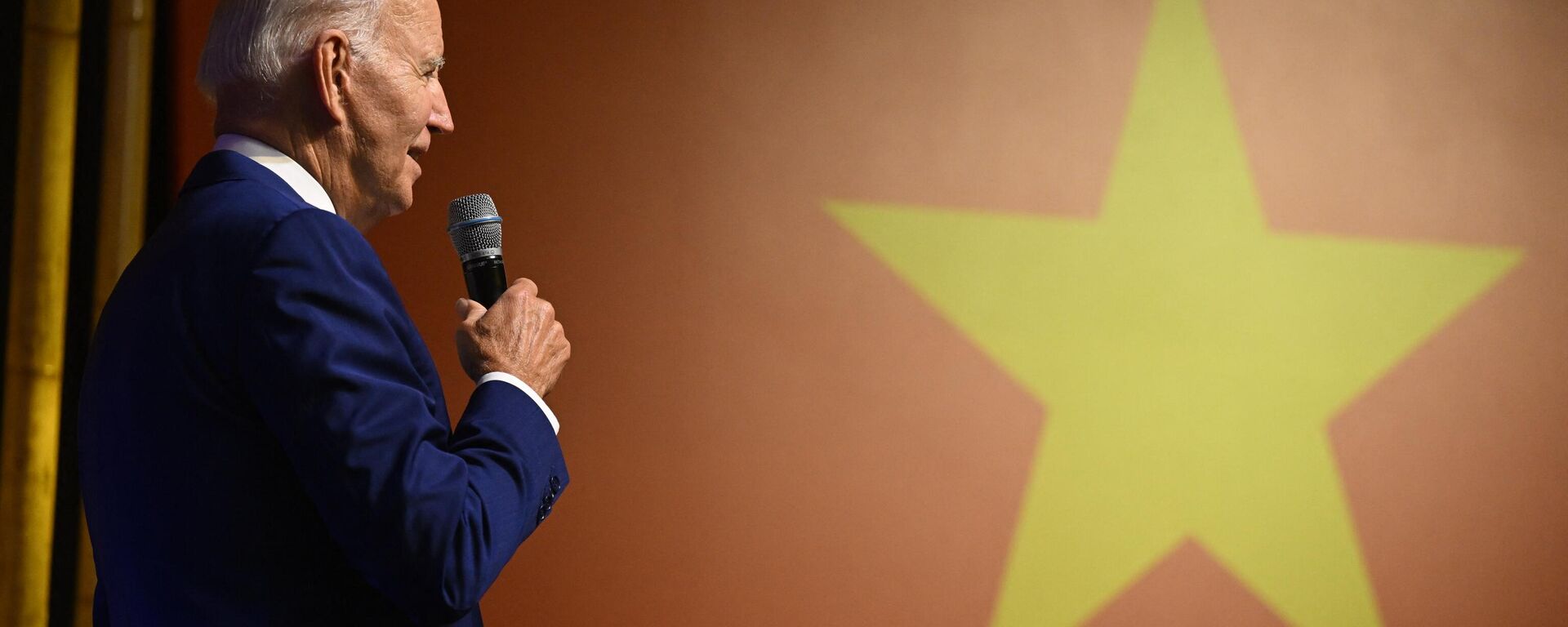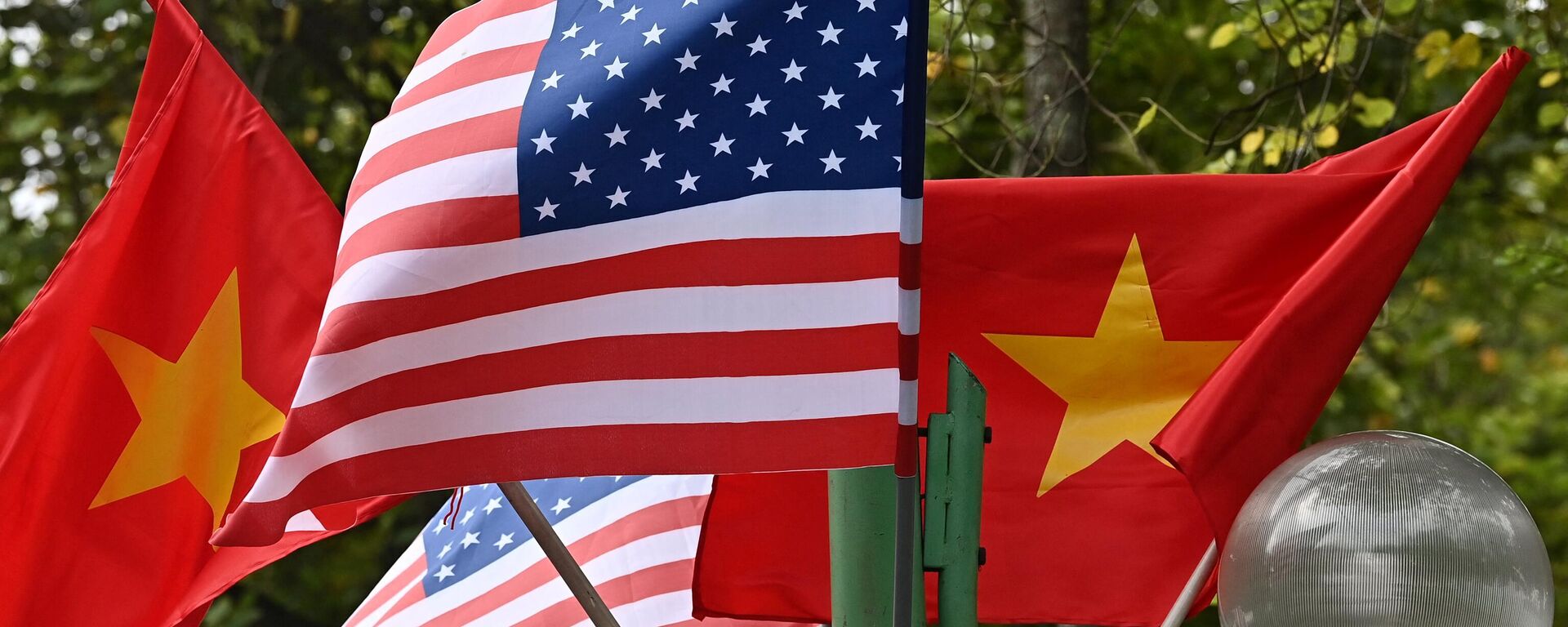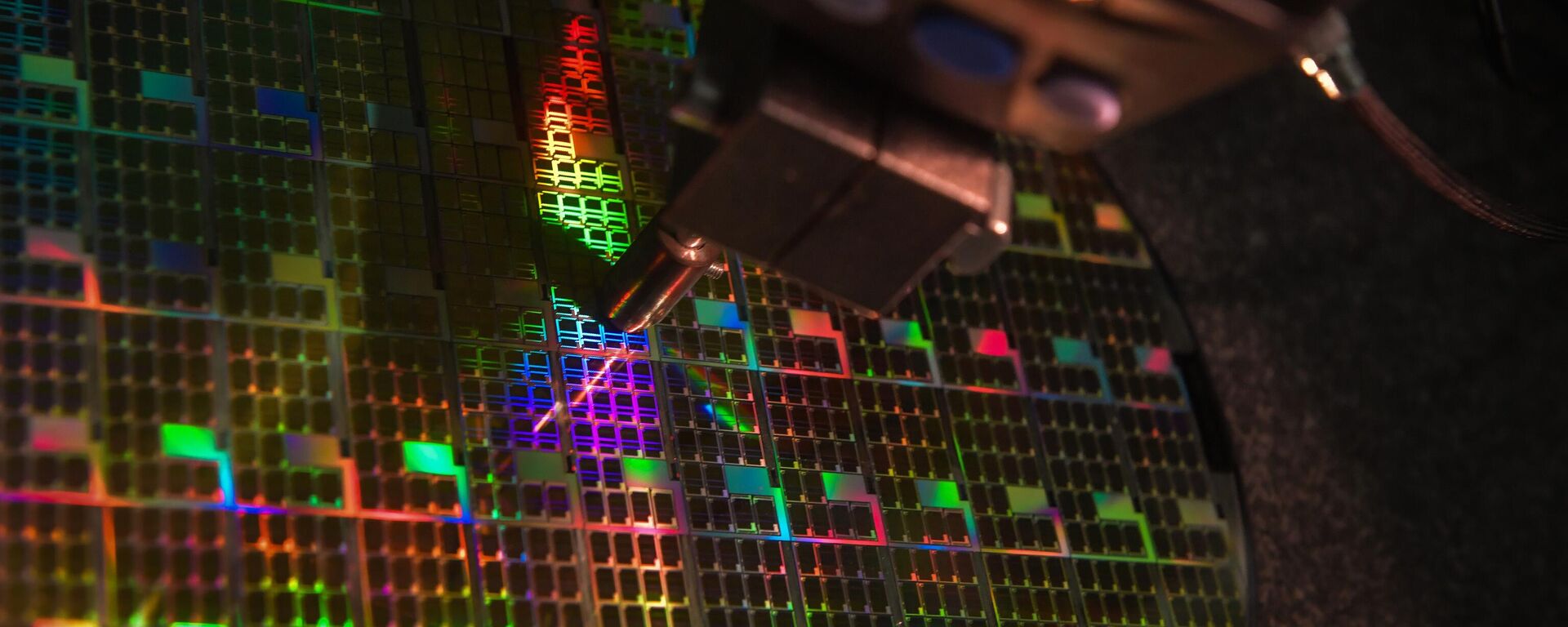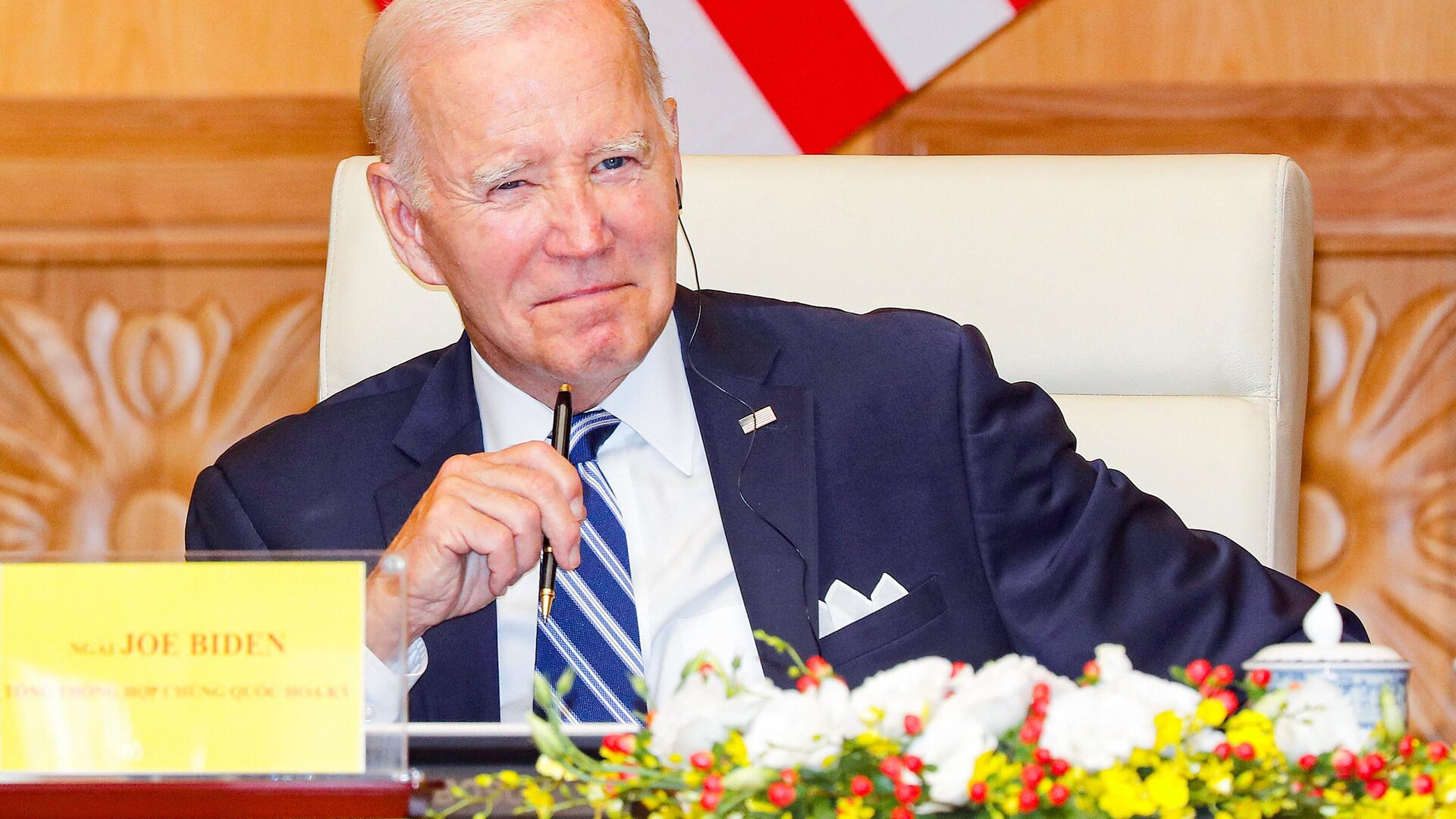https://sputnikglobe.com/20230911/us-seeks-to-divide-indo-pacific-use-new-alliances-as-proxies-against-china-1113272705.html
US Seeks to Divide Indo-Pacific, Use New Alliances as 'Proxies Against China'
US Seeks to Divide Indo-Pacific, Use New Alliances as 'Proxies Against China'
Sputnik International
The US goal is not to maintain stability in the Indo-Pacific region, but rather "to divide it against China," Brian Berletic, an ex-US Marine and independent geopolitical researcher and writer, told Sputnik.
2023-09-11T12:10+0000
2023-09-11T12:10+0000
2023-09-11T12:10+0000
analysis
us
joe biden
china
vietnam
xi jinping
semiconductors
indo-pacific
https://cdn1.img.sputnikglobe.com/img/07e7/09/0b/1113272904_0:157:3007:1848_1920x0_80_0_0_b2671cc5dcec6a322d3830555ac0f9aa.jpg
Washington’s goal is not to maintain stability in the Pacific region, as it often proclaims, but rather "to divide it against China," Brian Berletic, an ex-US Marine and independent geopolitical researcher and writer, told Sputnik.The recent flurry of activity displayed by the United States with regard to Japan, South Korea, the Philippines, and, recently, Vietnam, is all geared to drum up alliances that would serve the purpose of “isolating and containing China,” he added.US President Joe Biden arrived in Hanoi late Sunday after wrapping up his visit to New Delhi, India for the G20 summit. During a press conference, he touted a major upgrade to US-Vietnamese relations, saying that Washington and Hanoi had formally elevated their relations to a Comprehensive Strategic Partnership on Sunday. He also stated:The 46th POTUS also claimed that America had been using "an opportunity to strengthen alliances around the world to maintain stability.""Having India cooperate much more with the United States, be closer to the United States, Vietnam being closer to the United States. It’s not about containing China. It's about having a stable base in the Indo-Pacific, Biden said, adding that he wanted to "see China succeed economically, but I want see them succeed by the rules."US' 'Arbitrary Rules' PlaybookAs for the "international rules" cited by the US president, "they are not referring to international law, but rather arbitrary rules Washington itself is imposing on the world, often in contradiction to international law," the geopolitical researcher explained.According to Brian Berletic, President Biden's recent comments regarding his trip to Vietnam clearly demonstrate Washington’s wider foreign policy toward the region.While escalating trade and tech wars with Beijing, the US has been bolstering its presence in the Indo-Pacific region by forming alliances such as AUKUS, which groups it with Australia and the UK, and the Quadrilateral Security Dialogue (QUAD), which also incorporates Australia, India, and Japan. The recent trilateral summit with South Korean President Yoon Suk-yeol and Japanese Prime Minister Fumio Kishida, along with a slew of large military drills with Japan, Australia, and the Philippines in the South China Sea in recent days, all fit into Washington's Indo-Pacific playbook. Vietnam was next on the list of regional countries to "woo" so that it could serve America's geopolitical interests, pundits told Sputnik. Hanoi was offered financial support and technology-led initiatives to coax the ASEAN-member into agreeing to upgrade bilateral relations to a "strategic partnership." Previously, the US was listed at the bottom of Vietnam’s three-tiered hierarchy of partnerships – comprehensive, strategic, and comprehensive strategic.Ultimately, bearing in mind all the recent moves made by Washington, it is very clear that the creation of various US-led "alliances" in the Pacific region "are aimed at isolating and containing China," Berletic underscored, adding:'Futile' Efforts to Isolate China Economically After US-Vietnam talks ended on the weekend, an explanatory document was released, indicating that the new "status" would include a new semiconductor supply chain partnership, along with a science and technology research agreement, boosted enhanced trade and investment ties in such areas as agriculture, loans, climate, human rights, health, rare earth minerals, and energy.The agreements come as the US has been spearheading an effort to block China's access to high-end semiconductor chips produced in the Netherlands, Taiwan, South Korea, Japan, and the United States. Earlier in the month, US Commerce Secretary Gina Raimondo told media that Washington was "not going to sell the most sophisticated American chips to China that they want for their military capacity," adding that the US was "going to be as strict as can be and as hardline as possible denying China the most sophisticated chips."The expert reminded that China boasts a larger population and industrial base than the US and its allies, and recalled statements made by Chinese President Xi Jingpin, to the effect that “China's economy is an ocean, not a pond," and "US efforts to dry China up economically can be compared to throwing a towel into the ocean and expecting it to soak up all of its water… In other words, US efforts are 'ultimately futile.'"
https://sputnikglobe.com/20230910/i-dont-want-to-contain-china-biden-says-as-us-announces-strategic-pact-with-vietnam-1113260947.html
https://sputnikglobe.com/20230910/vietnam-has-no-interest-in-joining-us-orchestrated-anti-china-coalition-1113247393.html
https://sputnikglobe.com/20230905/china-reportedly-creates-40-bn-semiconductor-fund-to-blow-off-western-restrictions-1113136163.html
china
vietnam
indo-pacific
Sputnik International
feedback@sputniknews.com
+74956456601
MIA „Rosiya Segodnya“
2023
News
en_EN
Sputnik International
feedback@sputniknews.com
+74956456601
MIA „Rosiya Segodnya“
Sputnik International
feedback@sputniknews.com
+74956456601
MIA „Rosiya Segodnya“
indo-pacific region, us alliances in pacific, contain china, us trade and tech war against china
indo-pacific region, us alliances in pacific, contain china, us trade and tech war against china
US Seeks to Divide Indo-Pacific, Use New Alliances as 'Proxies Against China'
US President Joe Biden visited Hanoi on the weekend, meeting with Vietnamese General Secretary Nguyen Phu Trong and other key leaders. Biden announced a major upgrade to US-Vietnamese relations, including in the security sphere, at a subsequent press conference, adding that he was not looking to "contain China."
Washington’s goal is not to maintain stability in the Pacific region, as it often proclaims, but rather "to divide it against China," Brian Berletic, an ex-US Marine and independent geopolitical researcher and writer, told Sputnik.
The recent flurry of activity displayed by the United States with regard to Japan, South Korea, the Philippines, and, recently,
Vietnam, is all geared to drum up alliances that would serve the purpose of “
isolating and containing China,” he added.
US President Joe Biden arrived in Hanoi late Sunday after wrapping up his visit to New Delhi, India for the
G20 summit. During a press conference, he touted a major upgrade to US-Vietnamese relations, saying that Washington and Hanoi had formally
elevated their relations to a
Comprehensive Strategic Partnership on Sunday. He also stated:
"Really what this trip is about, it's less about containing China, I don’t want to contain China. I just want to make sure we have a relationship with China that is on the up and up, squared away, everybody knows what it’s all about."
The 46th POTUS also claimed that America had been using "an opportunity to strengthen alliances around the world to maintain stability."
"Having India cooperate much more with the United States, be closer to the United States, Vietnam being closer to the United States. It’s not about containing China. It's about having a stable base in the Indo-Pacific, Biden said, adding that he wanted to "see China succeed economically, but I want see them succeed by the rules."

10 September 2023, 18:13 GMT
US' 'Arbitrary Rules' Playbook
"US President Joe Biden is just the most recent in a long line of US presidents playing a role in a concerted effort to encircle and contain China. It is a policy operating behind a smokescreen of contradictory rhetoric intended to portray the United States as underwriting peace and security in the Asia-Pacific region while depicting China’s reactions to US encirclement as irrational aggression," Brian Berletic said.
As for the "international rules" cited by the US president, "they are not referring to international law, but rather arbitrary rules Washington itself is imposing on the world, often in contradiction to international law," the geopolitical researcher explained.
According to Brian Berletic, President Biden's recent comments regarding his trip to Vietnam clearly demonstrate Washington’s wider foreign policy toward the region.
While escalating
trade and tech wars with Beijing, the US has been bolstering its presence in the Indo-Pacific region by forming
alliances such as AUKUS, which groups it with Australia and the UK, and the Quadrilateral Security Dialogue (QUAD), which also incorporates Australia, India, and Japan. The recent
trilateral summit with South Korean President Yoon Suk-yeol and Japanese Prime Minister Fumio Kishida, along with a slew of large military drills with Japan, Australia, and the Philippines in the South China Sea in recent days, all fit into Washington's Indo-Pacific playbook.
Vietnam was next on the list of regional countries to "woo" so that it could serve America's geopolitical interests,
pundits told Sputnik. Hanoi was offered financial support and technology-led initiatives to coax the ASEAN-member into agreeing to upgrade bilateral relations to a "strategic partnership." Previously, the US was listed at the bottom of Vietnam’s three-tiered hierarchy of partnerships – comprehensive, strategic, and comprehensive strategic.
Ultimately, bearing in mind all the recent moves made by Washington, it is very clear that the creation of various US-led
"alliances" in the Pacific region "
are aimed at isolating and containing China,"
Berletic underscored, adding:
"The nations invited into them are themselves targeted by political capture by the US to compel them to make decisions that increasingly put their respective nations on a belligerent footing vis-a-vis China despite China often being the largest trade and development partner of nations in this region."

10 September 2023, 11:17 GMT
'Futile' Efforts to Isolate China Economically
After
US-Vietnam talks ended on the weekend, an explanatory document was released, indicating that the new "status" would include a new
semiconductor supply chain partnership, along with a science and technology research agreement, boosted enhanced trade and investment ties in such areas as agriculture, loans, climate, human rights, health, rare earth minerals, and energy.
The agreements come as the US has been spearheading an effort to block China's access to high-end
semiconductor chips produced in the Netherlands, Taiwan, South Korea, Japan, and the United States. Earlier in the month, US Commerce Secretary Gina
Raimondo told media that Washington was "
not going to sell the most sophisticated American chips to China that they want for their military capacity," adding that the US was "
going to be as strict as can be and as hardline as possible denying China the most sophisticated chips."
"However, as the recent development of indigenous microchips in China despite extensive US sanctions aimed at preventing such developments demonstrate, efforts by the US to isolate China economically and technologically will only spur China to invest more into circumventing and overcoming these efforts," Brian Berletic pointed out.
The expert reminded that China boasts a larger population and industrial base than the US and its allies, and recalled statements made by Chinese President Xi Jingpin, to the effect that “China's economy is an ocean, not a pond," and "US efforts to dry China up economically can be compared to throwing a towel into the ocean and expecting it to soak up all of its water… In other words, US efforts are 'ultimately futile.'"

5 September 2023, 16:26 GMT







